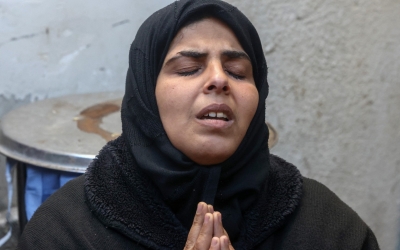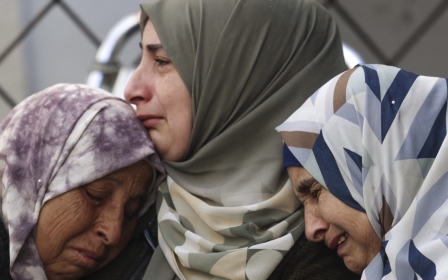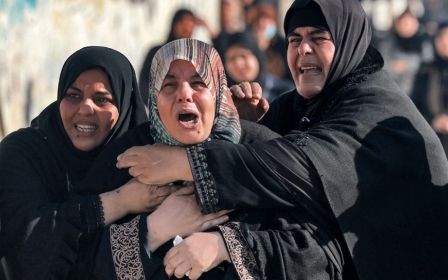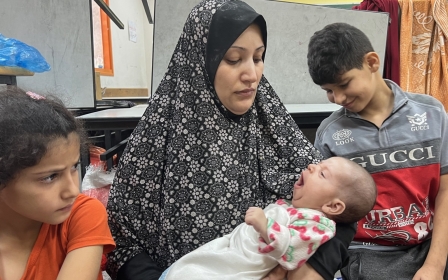War on Gaza: How reproductive rights are under siege
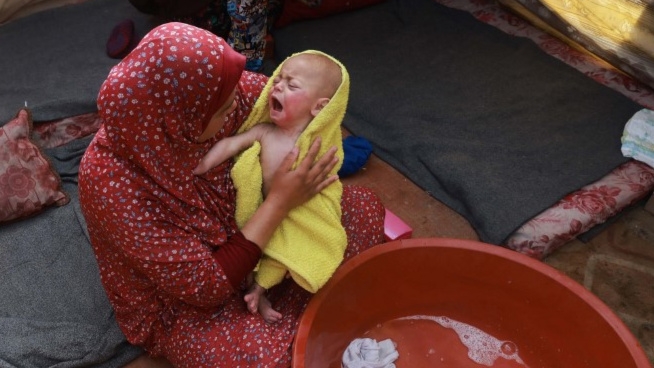
As Israel continues its onslaught against Gaza, Palestinian women face a lack of access to basic reproductive care. They have been forced to rip up tents to use as menstrual products because they cannot find any in the besieged territory.
Many women who are pregnant have no access to sanitary or safe healthcare, a situation that continues after they give birth.
As our own reproductive rights are stripped from us in the United States, our silence on Palestinian women is loud and hypocritical. Palestine is a reproductive justice issue, and western feminists who claim to care about reproductive rights are betraying Palestinian women and girls in Gaza by refusing to speak out.
Since Israel's war on Gaza began on 7 October, Palestinians have faced a total deterioration of reproductive healthcare. The siege has caused a shortage of menstrual products, forcing women to resort to using strips of cloth in place of sanitary pads, which puts them at risk of serious infections and toxic shock syndrome.
The trickle of aid that reaches Gaza rarely includes hygiene products, and many families lack access to running water and toilets.
New MEE newsletter: Jerusalem Dispatch
Sign up to get the latest insights and analysis on Israel-Palestine, alongside Turkey Unpacked and other MEE newsletters
At the same time, pregnant women are being forced to give birth in unthinkable circumstances. Some are undergoing caesarean sections without anaesthesia, while others are giving birth in tents. The miscarriage rate in Gaza has skyrocketed by 300 percent since October.
Hospitals in Gaza are unable to provide proper care to pregnant women because the territory's entire healthcare infrastructure has been destroyed by constant bombings. Gaza's two largest hospitals have ceased to function amid shortages of electricity and fuel. Women fortunate enough to get C-sections in a hospital are often discharged within a day due to a lack of capacity.
Horrific conditions
After giving birth in a territory ravaged by bombings and besiegement, new mothers are left to fend for their newborns in the same horrific conditions. Palestinians in Gaza live each day under constant threat of bombing and without access to sufficient water, food or shelter.
The Palestinian death toll since October has surpassed 30,000, and more than 570,000 people in Gaza are experiencing famine levels of starvation, according to the United Nations agency for Palestinian refugees. Many women are unable to breastfeed due to malnutrition, and cannot access formula as a result of the ongoing siege.
Follow Middle East Eye's live coverage of the Israel-Palestine war
The number of Palestinian women lacking access to sexual and reproductive health services has increased from 94,000 to more than one million since October.
In Gaza, reproductive justice is not merely under threat. The right to reproductive care has been demolished by merciless bombing and an inhumane siege. Gaza should be at the centre of conversations around reproductive justice. But where are the rallying cries of western feminists who claim to care about this issue?
Despite our own country's regression in reproductive care, we cannot possibly fathom what Palestinian women and girls are being forced to endure in Gaza
While the silence of western feminists on Gaza is loud, it is not surprising. Western feminism, particularly white western feminism, has a history of cherry-picking which issues - and which women - warrant advocacy and attention. Palestine rarely makes the list.
Feminists in the US have long relied on an unholy alliance with their government to advance their aims. The western feminist movement has long been tied to the agendas of the state, both political and military.
Western feminists played a major role in justifying the US invasion of Afghanistan in 2001. The Feminist Majority Foundation advocated for the invasion to save Afghan women from the Taliban, while ignoring opposition from Afghanistan's own feminist organisation, the Revolutionary Association of the Women of Afghanistan.
Voices ignored
In a similar fashion, western feminists are ignoring the voices of Palestinian and Arab women calling for an end to Israel's slaughter of Palestinians. While the US continues to funnel aid to Israel to support its massacre of Palestinians, western feminists are apparently content to stay silent on the horrific consequences for Gaza's women and girls.
In the US, feminists have seen reproductive rights stripped away by our government. Since the overturning of Roe v Wade in 2022, states across the country have passed abortion bans and restrictions. Across the US, people face unequal access to reproductive and sexual healthcare, with poor and Black women experiencing disproportionate barriers to care.
Western feminists have boldly protested against the erosion of reproductive rights in the US and highlighted the importance of access to reproductive healthcare. This makes their silence on the erosion of reproductive rights in Gaza all the more noticeable and hypocritical.
Despite our own country's regression in reproductive care, we cannot possibly fathom what Palestinian women and girls are being forced to endure in Gaza - both physically and psychologically. Western feminists have all but ignored how a massacre funded by their own government is demolishing Palestinians' access to reproductive care.
As we see reproductive rights come under threat in our own country, our capacity for solidarity with Palestinian women in Gaza should only grow. We have an opportunity to learn from our mistakes and choose to elevate the voices and causes of Palestinian women.
A rare example of this kind of solidarity is the Los Angeles chapter of Codepink, a US feminist organisation, joining forces with the Palestinian Feminist Collective to call for a ceasefire and reproductive justice in Gaza on International Women's Day.
Gaza is a reproductive justice issue. As feminists, we have an obligation to speak out for the women and girls of Gaza, and to demand an end to the onslaught that is destroying their access to reproductive care.
The views expressed in this article belong to the author and do not necessarily reflect the editorial policy of Middle East Eye.
Middle East Eye delivers independent and unrivalled coverage and analysis of the Middle East, North Africa and beyond. To learn more about republishing this content and the associated fees, please fill out this form. More about MEE can be found here.



